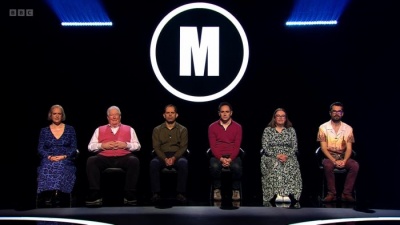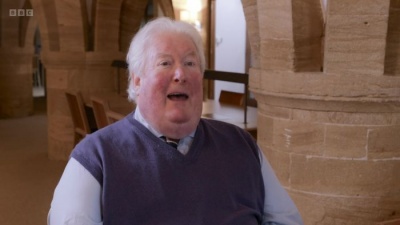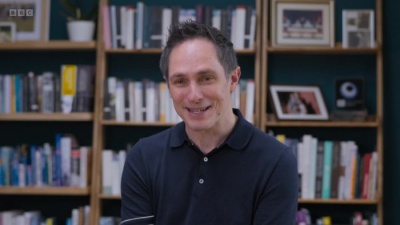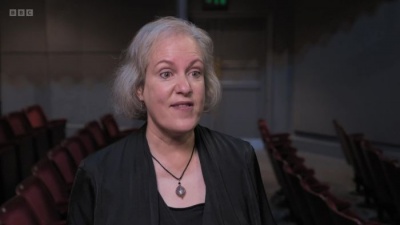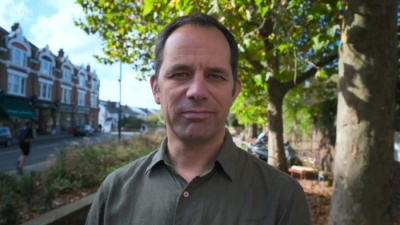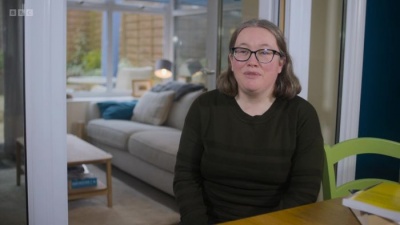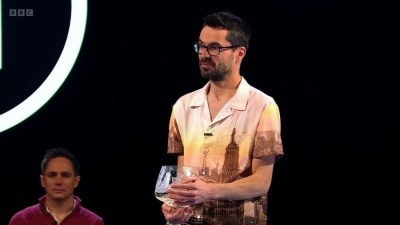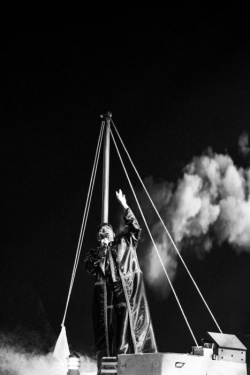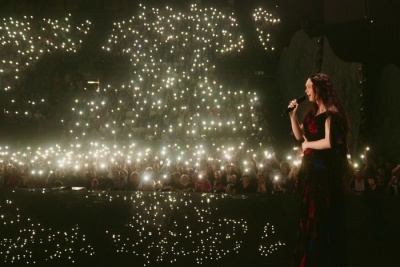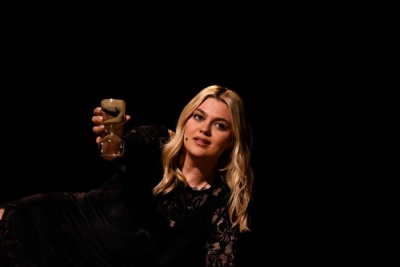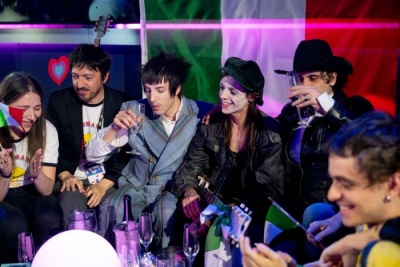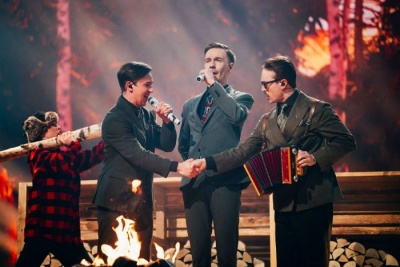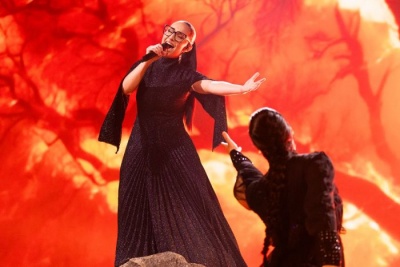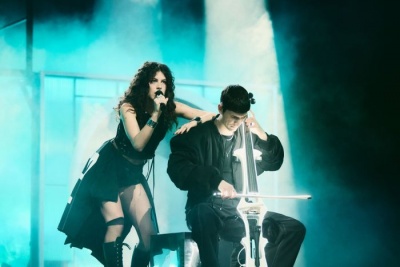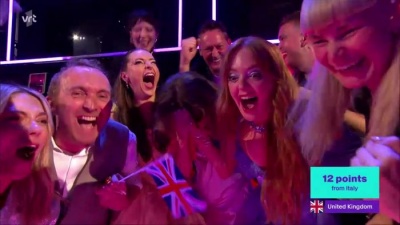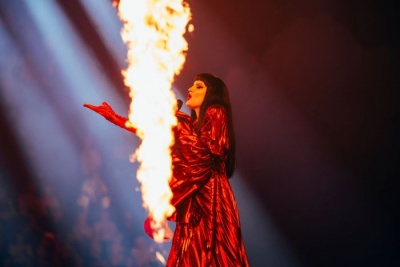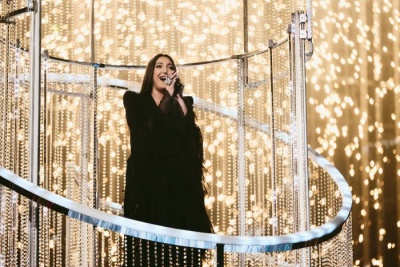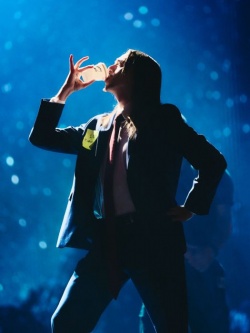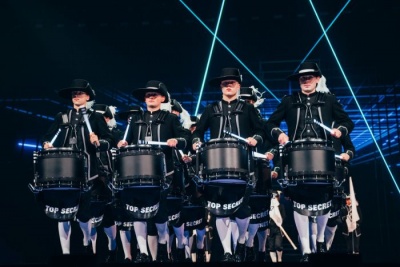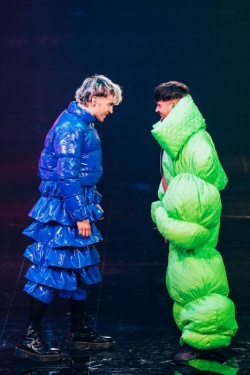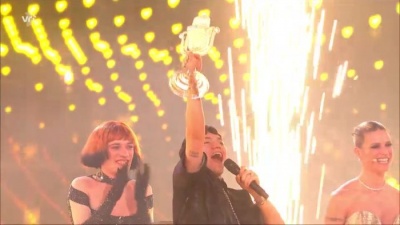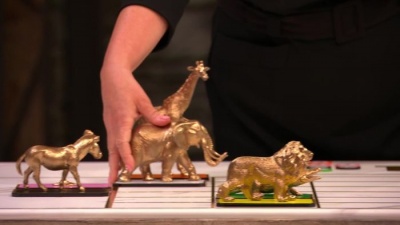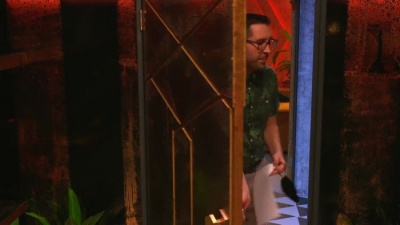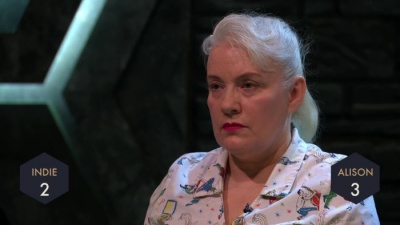Weaver's Week 2025-05-25
Last week | Weaver's Week Index | Next week
In another jam-packed Week, we have the Eurovision Song Contest final, and the results of an unorthodox animal race on Genius Game. Should you not want to know the results, make your way to your favourite catch-up service pronto.
Contents |
Mastermind
Hat Trick and Hindsight for BBC2, final on 19 May
Nancy Braithwaite, a teacher, takes the stage plays of Tom Stoppard. As is traditional, the finalists get to make a short film about their passion. "I'm sorry, I've got to revise rather than go to the pub," as Nancy revises with her partner Steve. She was a quizzer in the Sixth Form, and won a national title. Nancy rather draws the short straw for her location visit, going to the Old Vic Theatre, and being lectured at by Mark Lawson. A couple of errors in the two minutes of specialist questioning, but a good educated guess to the final one leaves her on 10 points.
John Harden, a school administrator from Sherborne, is completing the 1953 ascent of Mount Everest in two minutes. In his film, John introduces us to his three children, and pays tribute to his late wife Caroline who insisted he apply and show what he could do. His connection to Everest is through the Sherborne School, an old boy was on the expedition; he also has a chat to Peter Hillary, the son of mountaineer Edmund. An early error means there's no perfect round, but John reaches the lofty heights of 10 points.
Ivan Milatovic is going to talk about the music of Led Zeppelin, a heavy rock band. Ivan is from the former nation of Yugoslavia, speaks six languages, and was a line judge at the Wimbledon umbrella and rainwear exposition. We chat to his wife, parents, and join him at the Olympic Studios (now a cinema) in Barnes where the Zep's first album was recorded. Radio 2's Bob Harris is on hand to talk about the band. One good thing about this piece of exposition: it means we get a brief introduction from a familiar face in the introduction, rather than during the questions. Perfect until the closing seconds, Ivan finishes on 12 points.
Dom Tait, a research director, talks about penguins. He's appeared on University Challenge and Only Connect, and completes the Quizzy Mondays triple bill. Dom's interested in the natural world, and has all sorts of penguin paraphernalia. He's off to Bird World to talk to Polly, the human who looks after the penguins. Other people get a good luck message from Robert Plant, Dom gets to throw fish to the penguins and is already a winner. Dom is sharp in his replies, answering as soon as the question's finished; one error and 12 points.
Claire Reynolds, an actuary, is going to tell us about Emmy Noether. A mathematician from the turn of the century, it's a good fit for Claire's degree. She talks to Marika Taylor from Birmingham University's school of maths, and this column is surprised to see the old blackboard is still there after so many years. There's support from her mother Wendy and aunt Jill, and from Countdown fave Rachel Riley. The first Perfect Round of the night; twelve questions, 12 points!
John Robinson, a teacher, gets to talk about the Empire State Building. He takes us to his school, we see a few students, a clip of him winning half a million quid on Who Wants to be a Millionaire a few years ago, and quizzing with the 1990 Mastermind champion David Edwards. The Empire State Building, a skyscraper in New York, has been graced by John in the past. Been there, done that, bought the shirt, worn the shirt on network television. He talks with Carol Willis is the head of the building's history division. "If you put the effort into your revision, you'll get the rewards", his motto. One error, 12 points!
And, at the end of the round, it's all a bit Eurovision: two players have TEN POINTS!, four have DOUZE POINTS!!
Second round, same order as the first. Nancy Braithwaite has a couple of stutters early in her round, and perhaps this throws her off her stride. A complete brain fart in the final question means she finishes with 23 points (and 1 pass).
John Harden might not know Michael Gove, but that only makes him lucky. However, after confusing burritos with fajitas, John falls into a bit of an error spiral, throwing out plausible answers that turn out to be wrong. He finishes with 21 points.
Ivan Milatovic has a lot of close misses – the Euphrates rather than the Tigris, nitrogen rather than methane for the gas coming out of Uranus. But there are lots of good answers – barristers take silk, it's capital gains tax, and the 1812 overture. Ivan finishes with 22 points (and 1 pass).
Dom Tait was the best general knowledge player in the series, and he barks out "skin", "taxidermy", "Tokyo", "TB" almost before we know what the question was asking. There are some errors – Dom confuses a blouse with culottes – but the round is moving quickly and he's able to squeeze in a few more questions than the others managed. The final total is 25 points; takes the lead, leaves something for the others to tilt at.
Claire Reynolds is just a little slower than Dom to answer: when Dom was snapping the fingers off host Clive Myrie, Claire is just waiting to be sure he's finished before pouncing. And pounce she does – Tarzan's mate Jane, the ancient Roman road Watling Street, the kiwi fruit, the plot of Ghost – all provide points in very quick order. Barely a single error in the round, and she takes the lead on 29 points.
John Robinson knows the task ahead of him: steep after Dom's round, now perhaps as tall as the building on his shirt. A little bit of a flub as the brain went "bibble" before answering the first question, but when it engages, John is away. Three errors will cost the game: mixing the speed of light with the speed of sound is one, kings of Denmark and Sweden is another. But where's the third coming from? He's right on the Greek letter zeta, the wars of the roses, the sovereign coin – now John is one adrift. Nietzche's description of the ideal man draws level, and the philatelic term "first day cover" brings the round to a close.
The champion, with a Mastermind score of 30, is John Robinson. Congratulations to him, and to the other contestants: they've made it to the summit of television quizzing, and John has planted his flag in the summit.
Mastermind will return towards the end of the summer.
Eurovision Song Contest 2025
The final, 17-18 May, seen on BBC1
This year, to tell the best story, we're going to run down the results in jury order.
"Wasted love" won the contest for ÖRF (shown on screen as "Austria"). Written by Johannes Pietsch, Teodora Spiric, and Thomas Turner, it's performed by JJ. A countertenor at university in Vienna, and a performer with the Vienna State Opera, JJ has also been on local talent show Starmania and ITV's The Voice. Finally! Someone from The Voice wins something big!
The song is an emotional journey, chronicling life's highs and lows. Like all good opera, the story is told more through music than it is through lyrics: we crash up and down with JJ through his performance, following the stream of the melody and the ululations of the voice.
The story is enhanced by a memorable staging, black-and-white and cropped to 4:3 like 1960s television. JJ is on a boat without a sail, tossed around by the sea. It's not a surprise to find the work of Sergio Jaén, who gave us the circle of candles stage design for Bambie Thug last year. It's like a short film performed live for your entertainment.
JJ gave a more stripped-down reprise of the winning song, shorn of the visual effects to showcase his immense vocal talents. The jury win, we can reasonably assume, came primarily from his vocal brilliance; the stage direction was popular with the public and tipped the score into uncatchable territory.
"Voyage" was second with the juries, Zoë Më for SRG SSR ("Switzerland"). A very gentle and tender song, and shot in the most remarkable way – a single camera hovers around Zoë's face, with a tissue-thin focus field so an outstretched hand is out of focus, and the audience's mobile phone lights show as amorphous bright spots. It's charming and lovely and thoroughly entrancing.
Second with the juries, and absolutely nowhere with the voting audience. Which, for reasons we'll get to, is somewhat less of a statement about the song than we might have said a few years ago.
"Maman" came third with the juries, Louane for France Télévisions ("France"). This was another gentle and tender song, all about the pleasure and pain of being a mother and a daughter. We'll remember "Maman" for its staging, a massive pile of cork chippings on the stage, with a slow trickle coming down from the ceiling; it's meant to resemble an hourglass filled with sand and must have been at the absolute limits of what the stagehands would accept.
Louane is a huge star in Francophone pop, she rose to fame on La Voix about ten years ago and has been a consistent hitmaker in the years since – as big a star as Lorde, if you ask us. "Maman" is from her album Chambre 12, which also contains the hit single "Avenir". It's a major coup to get Louane into Eurovision, convince her to put her career and album promotion on hold for a month while she does this sort of thing for the broadcaster.
"Valevo essere un duro" was by Lucio Corsi for RAI ("Italy"). A verbose ballad in Italian, comprehension was assisted by in-vision subtitles – in English rather than the broadcaster's local language. We think it's the first time subtitles have been burned into the performance, and it seems to have helped the song get over the language barrier. "Valevo essere un duro" is also notable for Lucio playing the harmonica on stage, as an extension to his vocal; it's the first instrument to be properly performed on the stage since the last century. And it's notable for Lucio and his band looking like six incarnations of David Bowie.
"C'est la vie" from Claude (AVROTROS, "Netherlands") was the last song to finish with more than half of the winner's marks from the jury. It's an absolute grower, Claude sings from the heart and connects with excellent vocals. Relatively few votes from the public, which may be because Claude is Black and from the Congo.
"Bara bada bastu" was the pre-contest favourite, KAJ represented SVT ("Sweden") with a song about sauna culture. It gained from a spectacular staging, depicting life both in and outside a traditional Nordic sauna. The cheeky guys made a joyful sound, which the juries though was decent and the televote loved. Wasn't a winner, wasn't close to being a winner, but any song finishing on the magic 321 points is not going to be confused with Dusty Bin.
Love from the juries – but not the public – for "Bur man laimi", Tautumeitas's entry for LTV ("Latvia"); the performance of witches and precision choreography was always going to go down better with the professionals. Love from both quarters for "Asteromata" (Klavdia for ERT "Greece"); a bespectacled young woman sings while walking along a jetty in front of a burning tree. Very atmospheric, very mean 'n' moody, well worthy of its hundred points from the jury.
There was some jury love for some of the populist songs: "Espresso macchiato" by Tommy Cash (EER "Estonia") and Erika Vikmann's "Ich komme" (YLE "Finland"). Tommy is a surrealist comedian in the style of Vic Reeves, his song was a gentle josh at – well, we're not quite sure what he was joking at, but it probably involved taking the rise out of Italians. Erika was more direct, with her song about having a very good time. We've covered "Serving" (Miriana Konte for PBS "Malta") in the previews; suffice to say that the staging left absolutely nobody in any doubt what was on the menu.
Also in this little run was "Baller" (Abor & Tynna for ARD "Germany"), a song that was absolutely at home in the dance clubs of Berlin, an aggressive bassline and punchy vocals. Didn't sound terribly good at home, the producers made the very odd decision that nobody was allowed to send deep bass notes, and "Baller" notably suffered when compared to the version on the CD. Nevertheless, "Baller" has proved to be the song that gets a lot of streams, and is simple enough to cross linguistic boundaries, and might turn into the pan-European hit of the summer as "Tattoo" did a couple of years ago.
The producers also decided to make all the songs subject to a field-reduction effect, so that the whole picture changed rather than the more normal fluid motion, and we think it looks absolutely horrendous and completely negates the point of "high definition" television and anyone who signs it off needs to go boil their head until they see the error of their ways. Ahem.
"Twelve points to the United Kingdom!"
"What the hell just happened?" asked Remember Monday (BBC, "United Kingdom"). A divisive performance. There are those who will point to the fact that it was soundly rejected by the televote as a suggestion that it was a failure. We accept that the televote gave the song no points, and suggest that this was a successful song.
The vocals were absolutely on point, perfect close harmonies. Do you have any idea how difficult it is to sing three-part harmony? One voice has got to take the top note, one has got to sing exactly one octave lower, and the third has got to fit either a perfect fourth or a perfect fifth below – just the right side of halfway. We don't think there was another example of harmony singing in the contest – Tautmeitas primarily went for unison singing, where all six catwomen were aiming for the same note,
And the staging was exactly right: an oversized fallen chandelier provided a visual spectacle for the trio to dance around, a dressing partition bookended the performance. One of the very few songs where people tried to move and sing at the same time, and all in costumes that add to the story. It's so much better than previous BBC failures: the frumpy light-up dress inflicted on "Still in love with you" a decade back, or the can't-be-bothered trumpets of "Embers".
"What the hell just happened" deserved every last mark from the juries. That it didn't connect with the televote is bizarre, we cannot explain it. Maybe the televote doesn't recognise good singing when it hears it. Maybe the song was too much of a grower, and it'll turn out to be the "Snap" of this year's contest. There is work to do, there is always work to do, and although the result is disappointing, this is clearly a massive step up from the abject BBC entries of the last decade.
A couple of songs felt undermarked by the juries: "Bird of pray" (Ziferblat for UA:PBC "Ukraine") and "Zjerm" (Shkodra Elektronike for RTSH "Albania") were high art installations, telling visual stories that made sense in every language. "Zjerm"'s relative failure with the juries surprises us: it seems that individual jurors who didn't get it really hated it, and dragged the song down badly. We must also note "Tavo akys" by Katarsis (LTV, "Lithuania"), sent to us from a dystopian alternate reality filled with disappointment and angry music.
Hypothetical televotes
We sometimes give hypotheticals about how the televote would have been revealed if they still count up the scoreboard. Here's a few highlights.
"We begin the televote – I'm sorry. Zero points to Switzerland." Second place with the juries, nothing from the televote, and finishing bottom because ties always get broken against the host.
"Zero points to the United Kingdom." Always a risk. "Eight points... eight points to Malta." The people have spoken, the [songs].
Just 42 marks to "C'est la vie", which deserved far better and may show that Europe still isn't ready to vote for Black performers. 126 for "Astromeneta" and 173 for "Zjerm" proves that Europe is happy to vote for high art – the latter is fifth in the televote ranking.
"I have 178 marks... 178 points go to... Austria!" Jury vote winners get a decent but not overwhelming score from the televote. They're very much in the running, but any of the top three in the televote could still beat them.
"Next... Next I have 195 points." Whoever gets this can't win, of course, but the mere fact that it's 195 means "New day will rise" cannot win – there simply aren't enough points left in the contest.
"Two songs remain. One has 258 points." And that is the result. Whoever gets the 258 from the televote, whoever gets the 295, they cannot overcome "Wasted love". The winner is secure.
Actual televotes
So, "New day will rise" (Yuval Raphael for KAN, shown on screen as "Israel") finished on top of the televote. This caused a lot of grief: questions were asked by member broadcasters, and Martin Green (the new Director of the Eurovision Song Contest organisation) felt compelled to issue a statement.
To paraphrase the EBU's response, "we are happy that the vote was fair". We cannot dispute this claim: nobody has suggested other than that the votes registered were accurately counted, and the results as published were a correct reflection of those votes.
The complaints of the broadcasters appear to be "we do not believe the result was just", and the EBU statement is rather silent on this question. "Just" is a moral position, it requires the EBU to believe in something, and the EBU does not wish to do that – at least until it has had a conversation with its member broadcasters. And this will be a difficult conversation.
- AVROTROS and the NPO [the Dutch broadcasters] see the Eurovision Song contest being influenced by social and geopolitical tensions. To what extent does the contest still function as an apolitical, unifying, and cultural event? We want to raise that question, together with other countries, within the EBU.
- "We will ask the EBU whether it is time to update these rules or, at least, to examine whether the current rules allow abuse. You really should wonder if it makes sense for one person to vote twenty times," said the producer in charge at YLE [from Finland].
- "After putting in the card details, the card is verified and the votes are supposed to be cast. I never had to identify myself with my first and last name. Each user could therefore cast 20 votes with one bank card and one email address. The system didn't send a message to verify that the email address was real. So, what would be needed to vote another 20 times? Just another bank card and another email address," said a journalist from Spanish newspaper El País.
El País also told us that the company responsible for managing Eurovision's voting is the German firm Once, whose core business isn't remote voting but "creating and applying technology for live interaction during peak voting times". It's an entertainment-scale system, designed for entertainment shows – it's fast and it's accurate but it's not secure.
At least six broadcasters (VRT, YLE, RÚV, RTÉ, AVROTROS, and TVE) have asked the EBU what they think they're playing at, and these broadcasters reckon that the televote appears not to represent the views of the public. The declared result is somewhat remarkable, and the onus is on the EBU to at least explain why the result is accurate, and how they can be sure it represents the public's views – the latter point was elided from the EBU's statement.
Does the community – the viewers and the broadcasters and the fans – have confidence that the televote was representative of the community? No, and that undermines the televote. Is this good enough for Europe's biggest television show? No, not in this column's opinion. Will there be changes for next year? Almost certainly.
This column has long argued that Eurovision as an organisation is a political act, and that the Song Contest is inherently a political event. However much the organisers might wish otherwise, they cannot fight the forces of fact. The first step towards change is to acknowledge the situation; the sooner the EBU faces up to the real world, the sooner it will be able to reach a resolution that most reasonable observers can accept.
We must remember that Eurovision in general, and the Song Contest in particular, lives on the public's consent. There is no immutable law of nature that decrees the Eurovision Song Contest must remain popular forever. It is fashionable today, in a way it certainly wasn't when we started this column. The people of Europe want an excuse to party together; bad decisions by the administrators may drive them to take other opportunities for communal joy.
What will we remember from this year?
This year's takeaways? We're going to be contrarian, and look on the bright side. These are our reasons to remember Senior Eurovision 2025 with affection:
So much language diversity. Of the top three songs in the final result, three all have large sections in the English language. Of the top fifteen, three have large sections in the English language. French and Italian as foreign languages, Latvian and Lithuanian and Swedish get their just results, and "Volevo essere" hurdles the inch-high barrier with ease.
Three interval acts to go into the memory banks; and we wish Céline Dion had been able to make it four, but fully respect her non-appearance. "Made in Switzerland", a self-deprecating look at how everything comes from the Swiss. Käärijä × Baby Lasagna, the melding of the last two televote champions in a show that rocked hard and looked harder. And Nemo performed their new song, a wild and emotional journey through the hell of lazy assumptions and bits of a world that chose not to care.
Many people observed that the songs this year were all on a level, none stood out as better than the others. We have no problem with this, because all the songs were spectacularly good. Compare this year with (say) 2005, the depths of the all-televote error where everyone was putting in pale imitations of what worked last time. This year has so much more difference, it would take a particularly jaded palette not to love at least something. The songs were on a level, and that is levelling up.
Changes backstage made the contest much more fun for the participants. There were areas where phones could not be used, no photos, no selfies. These areas became chill-out zones, where the singers and songwriters could jam together, make friends, enjoy the vibes. That's something Junior Eurovision does so well, and it's great to see the old fogies' contest following suit.
And we closed with a credible overall winner. "Wasted love" is probably the end of pop-opera at Eurovision, we've enjoyed it for the past two years and now it's time for something else. And, let's be honest, nobody this side of Andrea Bocelli could possibly do popera better than JJ.
Eurovision next year in Vienna is absolutely assured because they do the New Year's Day concert, if you're awake at 10.15 that morning. For the Song Contest, it may be Vienna, Linz, Graz, they may go outside in Tarsdorf.
For now, we honour a worthy winner.
Genius Game
In its preview of this week's episode, the trusty old Radio Times described this week's episode:
- When even the contestants need to use a pen and paper to keep tabs on what's going on, what hope do viewers have? Tonight's challenge manages to be hard to follow, slow, and dull. Whispered conversations around the table, including exclamations of "split the crocs" and "flamingo – one!" ring out into a puzzle that truly puts the bored into board game.
Hate to say it, but the Rusty Old Radio Times is wrong. This was a very simple main match, with a simple tactic.
To move your nominated animal, you've got to have it with the highest unique number of tokens in the movement box. But each nominated animal removes a token from the box, so it's more difficult to move.
With seven players picking two of six animals, the best tactic is to have two or three people sharing an animal. Any more and there simply aren't enough tokens in the box to move it quickly. If you're the only person on an animal, there's little incentive for anyone else to move it.
There was a split into groups of four and three. Ken was right to suggest that his group permute four animals so that all options were covered. Ben was wrong to suggest that his group all glom onto one animal and guess the rest. Ben's trio could have done an incomplete permutation of four animals, knowing that at least one person would have both their animals covered by Ken's group. Or they could have completely permuted three animals, with the risk that all three could be covered by Ken's group.
In the opening moments, Charlotte intimated that she had a duo strategy; this was never explored further. Possibly more of a ruse to get Ben out of her hair; he went on to try and work with Ken, but was clearly rebuffed.
This episode was mostly about the interpersonal relationships. Some callbacks to previous episodes, how Ben had burned his social capital in Codebreakers to the point that nobody wanted him around. Some points were resolved in the episode, an apparent declaration by Charlotte that Ken was her biggest threat fizzled out after the two had a chat and worked out they were rather similar. And we saw Charlotte calling Bex, Alison, and Bodalia "naïve"; this may influence attitudes towards her later on.
Once it became clear the group of four had the upper hand, there was a lot of grovelling to the evident winner Bodalia. Pleasant words from Indie and Charlotte, Bex being quietly and confidently assertive. We got something of a threatening tone from Ben. It was clear that Ben was flustered, in one of those sliding doors moments he put a token to move the opposition's animal rather than his group's giraffe; perhaps his mental state was not there, and Ben would have been a blithering choice for the Death Match.
In the event, Bodalia chose Indie rather than Ben for the final challenge; she threw down the gauntlet to Alison, and was beaten by Alison's excellent memory and harsh stare.
This was an excellent episode for new viewers: foregrounding the interpersonal drama that's played out through the medium of strategic challenges. If you're humming and hawing about whether to watch Genius Game, start here: you can go back and catch up on the story, knowing the six to follow.
We're not going to publish at all next week, and will return to Genius Game on 15 June, just after the final.
In other news
If you're after a really long read about game shows, we point you to Hate the Player, Love the Game. A comprehensive history of challenges on challenge telly: on Survivor, The Crystal Maze, Masterchef Goes Large, Taskmaster, and foreign versions of Genius Game, also shows we don't have over here like The Amazing Race, The Mole, The Challenge. Something like 2000 pages of tasks, neatly summarised and graded from absurdly excellent to absurdly [singing]. It's a masterwork, it's the most complete thing we've ever seen, and we're absolutely awestruck. (And no, we've not forgotten that we're going to describe every challenge on 99 to Beat – late next month, most likely.)
Who will win The Piano, and does anyone really mind when everyone's this good? (C4, Sun). Bake Off The Professionals returns to Tuesdays (C4). A new contestant joins the fun on Round the Islands Quiz (Radio 4, Sun): foxy! Survivor starts again on TG4 in Ireland (Thu). Next Saturday has the Got Talent final (VM1 and ITV). On 2 June, Bridge of Lies returns to daytime telly (BBC1).
On 7 and 8 June, it's the annual 24 Hour Game Show Marathon (from 5pm, streaming at gameshowmarathon.com). Some formats we'll recognise, with Popmaster at 6pm, Blokken at 9pm, Would I Lie to You at 5am, Countdown in the obvious spot of 2pm, and closing at 4pm on Sunday with the traditional Deal or No Deal extravaganza. Everyone involved always has massive amounts of fun, and it's a great watch, and we wish them well.
To have Weaver's Week emailed to you on publication day, receive our exclusive TV roundup of the game shows in the week ahead, and chat to other ukgameshows.com readers, sign up to our Google Group.

